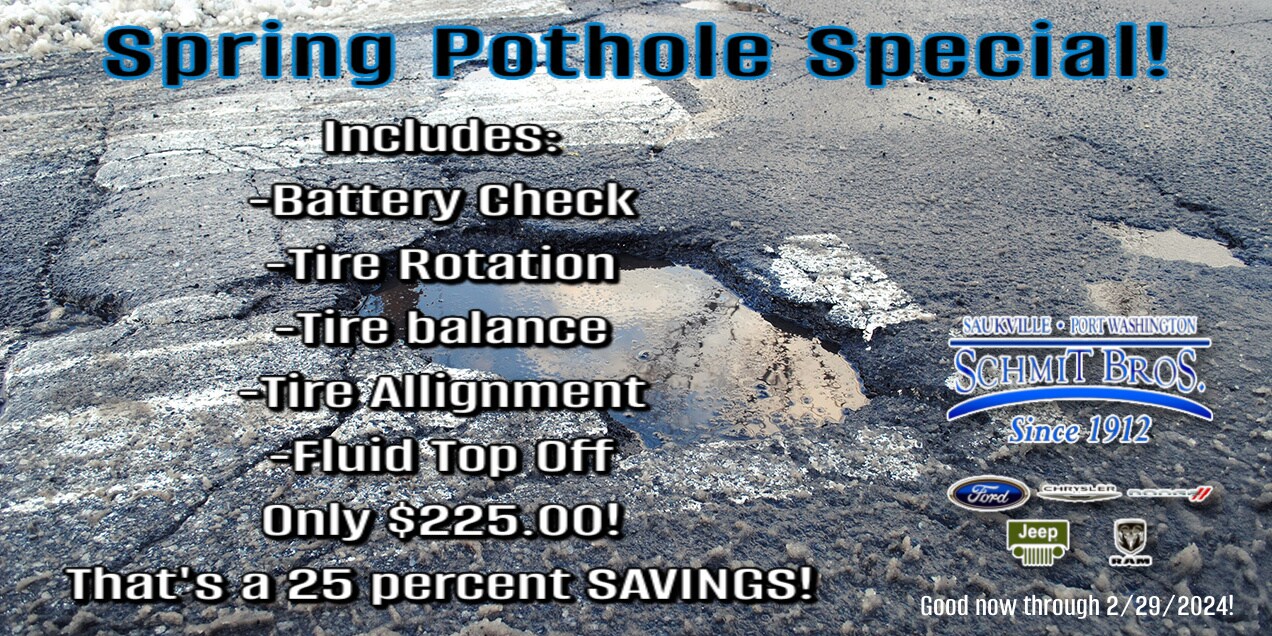
Potholes can damage your car – even if you react to avoid them. While some damage is immediately noticeable, it might take you a while to notice other damage. There are two factors that directly impact the type and the severity of the damage caused by potholes to your car: the speed that you hit the pothole and the depth of the pothole itself.
What type of damage can potholes actually cause? What should you do if you hit a pothole? When it comes to potholes, your tires are the most vulnerable part of your car. Common problems from potholes include sidewall bulges, tread separation, or a puncture. You might also experience uneven wear on your tires because of the alignment being knocked out of position by the pothole. You can also have damage to your rims due to a large or deep pothole. A sidewall bulge happens when your tire hits a pothole and the impact separates the airtight liner from the sidewall, allowing air to seep into the body of the tire. This causes a bubble in the sidewall which could blow out at any moment. Tread separation occurs when the tire is compressed against the wheel when you hit the edge of the pothole, slicing the rubber. Rims, on most modern cars, are aluminum: they are easily dented if you drive into a deep pothole. If your rims are dented, try and replace them sooner rather than later. A dented rim results in a poor seal between the rim and the tire, which can lead to air leaks and flats.
If you notice uneven wear, it’s best to keep an eye on it or talk to your mechanic at Schmit Bros to see what your best options are. But, if you notice any other damage, it’s recommended to get your tires changed as soon as you can.
Your wheels are also vulnerable to damage from potholes because it can cause bends, chips, and cracks in your wheel. This will prevent your wheel from forming an airtight seal. Additionally, a bent wheel won’t roll smoothly. Another potential wheel problem concerns wheel alignment. Hitting the hard edge of a pothole can jar your steering system, causing a misalignment. You may only notice this damage when your car pulls to one side or another or the steering isn’t as responsive as it used to be.
Cracked or chipped wheels have the potential to be a major issue, so it’s best to completely replace them. Bent wheels can sometimes be repaired. If you suspect your wheels are misaligned, for safety reasons it is important to get them checked and corrected quickly.
Your suspension smooths the bumps in the road, so you don’t feel them. However, a sudden impact with a pothole can give your suspension a knock, causing a variety of problems. Signs that there is a problem with your suspension include: your car pulling in one direction, the handling feeling loose, uneven tire wear, or unusual vibrations and sounds. Potholes cause damage when the initial force of hitting the pothole travels through the tire into the components of your steering and suspension system.
Cars with a low ride height have better handling but are more likely to be damaged by potholes. Cosmetic damage from potholes includes scrapes bumpers or side skirts. More serious damage includes scrapes along your undercarriage that cause rust and leaks or holes being ripped in your exhaust pipes, muffler or catalytic converter. If you do damage your exhaust pipes, there will be a lot of noise and possibly a loss of power. There’s also a good chance your exhaust will start to expel harmful pollution, including possibly leaking exhaust fumes into the cabin, which is potentially serious for your health. If you notice a problem with your exhaust, it is recommended to get it fixed as soon as possible due to the environmental and health risks. Leaks from your undercarriage should also be investigated and repaired.
We currently have a pothole special here at Schmit Bros on both our Ford and Dodge side with over 25 percent savings! Avoid those potholes and if you hit one and have cause for concern, stop in at Schmit Bros where we can help you!